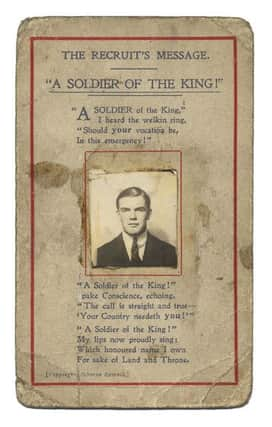Marking a life '˜cut short'


It is the account of her great uncle Private 14765 Charles Henry William Smith, who served with the Durham Light Infantry, and who gave his life for king and country during the First World War.
This is Pamela’s story: “My great uncle who was known as Harry, was born in Edith Street, Westoe, in 1896. He was the eldest child of Charles Henry William Smith (known as Henry) and Helen Jane Niddrie.”
Advertisement
Hide AdAdvertisement
Hide AdPamela says the 1911 census shows that at the age of 14, Harry worked at St Hilda’s Colliery, driving the horses to draw the coal wagons. (He would have been working from the age of 12). His mother worked as a charwoman.
In September 1914, Harry joined the armed forces.
“The attestation shows that he received notice to join, and that his age was 19 years and 330 days, yet he was only 17 years 9 months. (You had to be 18 to sign up and 19 to fight overseas).
“I ask myself, was Harry one of the many boys that were drawn to Lord Kitchener’s call for volunteers and who lied about their age.
“Like many young boys, Harry was expecting this to be an adventure, full of excitement, and with the promise that they would be ‘home in time for Christmas’. Did the recruitment officers turn a blind eye to any concern about Harry’s age or perhaps heledp Harry to lie on the form – after all, they were paid two shillings and sixpence for each new recruit.”
Advertisement
Hide AdAdvertisement
Hide AdWhatever the case, Harry was assigned to the Durham Light Infantry “C” Company 14th Battalion, and Private 14765 undertook his trainings at various camps, Newcastle, Aylesbury, Halton Park, High Wycombe and finally at Witley.
“His Regimental conduct sheet shows three offences. Firstly, for ‘improper conduct in taking meat from the Q.M.’s stores and cooking it’, he was given 48 hours Imp H L FL No 2. This meant he was imprisoned for 48 hours with hard labour, and placed in fetters and handcuffs for up to two hours in a 24-hour period.
“This was a common and brutal punishment during WW1.
“His next offence was to outstay his pass by four days, and for this he was given seven days confinement to barracks and forfeited five days’ pay. No doubt his mother would not have been too happy not to receive his salary.
“His final offence was to report sick without a cause. This was 10 days before his regiment was shipped out to Boulogne, for which he was given 10-day confinement to barracks. From this I can only conclude that Harry now knew it was not to be an exciting adventure and that he may not come back alive, and that was afraid. I ask myself, did he get to see his mother before he was shipped out? I guess not.”
Advertisement
Hide AdAdvertisement
Hide AdPamela goes on to explain that on the September 11, 1915, Harry’s regiment landed at Boulogne.
“After a long march, the division was brought up as reserve for the British assault at Loos, and they saw their first action on September 26, the second day of the battle. The division suffered over 3,800 casualties, with many men cut down by machine gun fire as they advanced on the Germans who had brought in large numbers of troops overnight for a counter attack.
“On November 28, 1915, the 14th DLI transferred to 18th Brigade in 6th Division.
“In 1916, they were again in action at Battle of Flers-Courcelette on The Somme. Harry died on February 21, 1916, from wounds he received in action. He was just 19 years and three months old – a life cut short.
Advertisement
Hide AdAdvertisement
Hide Ad“As you read his mother’s story (which I will bring to you later this week), you will see that Harry’s short life was full of hardship and tragedies.
Tomorrow: We conclude Pamela’s poignant story of her war hero relative.